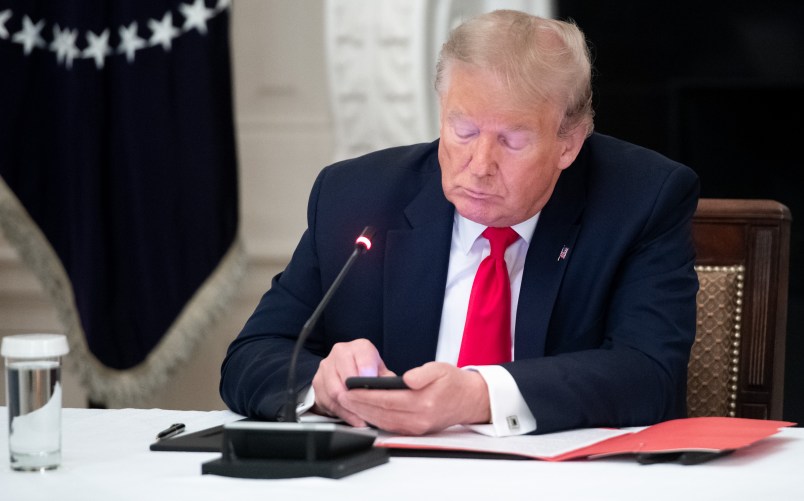Thursday’s dual Supreme Court decisions on Trump’s financial records were both, in one sense, a loss for the President.
But, in another way, they were a victory: Trump may have won a crucial battle in his bid to stop anyone from gaining access to information about his financial past before the November election.
In deciding a case about a congressional subpoena for records from Trump’s accounting firm and a criminal subpoena obtained by the Manhattan District Attorney, the Supreme Court likely effectively achieved the same result in both matters: pushing enforcement of either subpoena beyond the November election.
“The rank politics of both of these decisions are that it is highly unlikely that records that President Trump does not want to be disclosed before the election are going to be disclosed before the election,” said Andy Wright, a lawyer who has experience working on both the congressional side and the White House side of oversight issues.
In a challenge Trump brought against Manhattan District Attorney Cyrus Vance for a subpoena issued in a state criminal investigation, Trump had argued that he was immune from the criminal process. One attorney of his went so far as to say during appellate arguments that the President could not be investigated for shooting someone on Fifth Avenue while in office.
The Supreme Court ultimately rejected the “patently absurd claim” from Trump’s lawyers that the President “should have absolute immunity from state grand jury subpoenas,” said Peter Arenella, law professor emeritus at UCLA.
“But, Trump’s strategy all along has been to use the court challenges to slow the process down so he would not have to release his tax returns to anybody, state grand jury or Congress, until after the election,” Arenella told TPM via email. “So, score one abstract victory for the rule of law principle but appreciate that pragmatically Trump secured his real objective: no disclosure before the election.”
Trump attorney Jay Sekulow treated both decisions as a victory, expressing approval at the rulings in a statement.
“We will now proceed to raise additional Constitutional and legal issues in the lower courts,” he said.
White House Press Secretary Kayleigh McEnany praised both decisions in a statement, saying that the court found in Vance that “further proceedings are required in the lower court in which the President can raise additional arguments, including constitutional protections, against this frivolous and politically motivated subpoena.”
By the same token, McEnany praised the Mazars ruling for “declaring that more is required to establish a valid legislative purpose than the mere say-so of partisan committee chairmen.”
In Vance, the court remanded the case back to the federal district court level, “where the President may raise further arguments as appropriate.” Writing for the majority, the last two pages of Chief Justice John Roberts’s opinion are devoted to the options which President Trump still has available to him.
“Furthermore, although the Constitution does not entitle the Executive to absolute immunity or a heightened standard, he is not ‘relegate[d]’ only to the challenges available to private citizens,” Roberts wrote. “A President can raise subpoena-specific constitutional challenges, in either a state or federal forum.”
To Andy Grewal, a constitutional law professor at Iowa Law, Roberts struck down Trump’s argument that the President is immune from the criminal process, but left ample room for other concerns to be raised.
“It’s just saying, look, there are different ways to challenge the subpoena,” he said.
Despite that wiggle room, it’s worth noting that the Supreme Court roundly rejected the arguments that Trump had made for why the subpoenas weren’t legitimate.
In the Mazars case, the Supreme Court knocked down the notion that Congress has no right, or that the legislative purposes put forth by the House were somehow insufficient. By the same token, in the Vance case, the Supreme Court rejected Trump’s argument that he was immune from any sort of criminal process.
But in the House Mazars decision, Wright noted, the Supreme Court held back from affirming Congress’ right to issue subpoenas for the sake of oversight alone, separate from a legislative function.
“There used to be Supreme Court cases about how congressional oversight was a check on the legislative and this opinion doesn’t allow for oversight to be a check on the legislative as an independent constitutional boundary,” Wright, who is a founding editor of the legal blog Just Security, said. “And that’s where the election stuff matters — if you’re not going to have this information get in Congress’ hands before an election cycle, then the accountability piece is really not in play for what oversight’s functions are.”
It’s not clear how long it will take the courts to resolve the specifics of the Trump financial record dispute.
“We’re really in uncharted territory and I think it’s going to take a long time for this to get sorted out,” said Sarah Turberville, director of The Constitution Project at the Project on Government Oversight, a government transparency organization.
But according to Randall Eliason, a former federal prosecutor and professor at George Washington Law, a trip back to the lower court always seemed likely for the Vance case once the Supreme Court agreed to take it up last year.
“Long term, it’s a loss, and short-term, it’s a win if your primary aim is going beyond November,” Eliason said. “It says the President is not above the law, but it’s a short-term political win that he’s able to keep fighting.”






